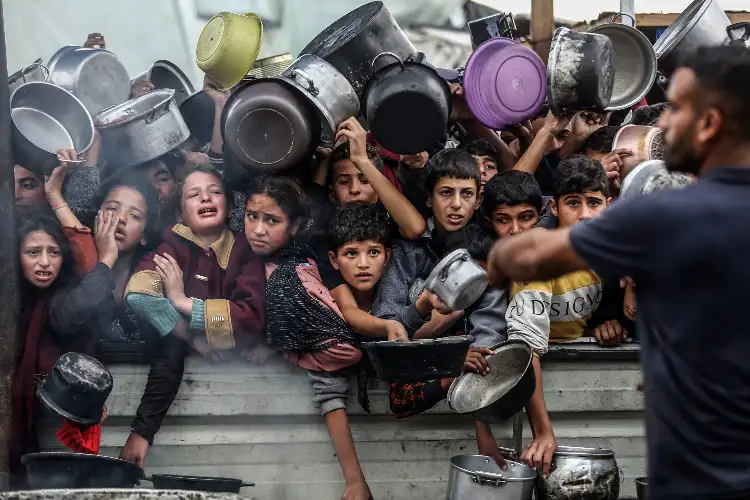
Cuts to aid and politicisation of relief undermine safety, access, and accountability in conflict zones
By Doug Specht
The International Development Committee’s latest report, Protection Not Permission: The UK’s Role in Upholding International Humanitarian Law and Supporting the Safe Delivery of Humanitarian Aid, published this week, arrives at a critical juncture for global humanitarian efforts. With aid worker casualties at unprecedented levels and access to supplies increasingly obstructed, the report warns of a ‘hollowing out’ of international humanitarian law (IHL) that threatens the foundations of civilian protection in conflict zones. Against a backdrop of rising geopolitical tensions and a shrinking UK aid budget, the report calls for renewed leadership from the UK – both as a champion of IHL and as a convenor of like-minded states.
The report makes several key recommendations, including that the UK support the International Criminal Court (ICC) and promote sanctions, arms export controls, and independent legal and investigative teams to address breaches of IHL. It warns that failing to protect all victims undermines the authority and effectiveness of IHL.
The report also underscores the importance of local voices in humanitarian action, recognising that local NGOs and civil society organisations bring valuable insights and relationships that improve aid delivery. While acknowledging challenges such as inadequate funding, poor coordination, and exclusion from decision-making, the report marks a shift away from top-down models and stresses the need for a more inclusive and equitable humanitarian sector. Crucially, it also recognises the importance of mental health support across local and international networks – noting that prolonged exposure to trauma can undermine both wellbeing and operational effectiveness.
The report is notable for its proposals on diplomacy and international cooperation. It acknowledges that traditional public diplomacy is often ‘patchy at best’ and advocates for a more coordinated approach that includes independent investigative bodies like the Humanitarian Fact-Finding Commission. These recommendations reflect an apparent willingness by the UK Government to pursue creative approaches to upholding IHL, even as existing mechanisms are increasingly stalled by political gridlock.
Limitations and shortcomings of the report
While the report provides a comprehensive analysis of the challenges facing humanitarian aid and IHL, it is not without shortcomings. It does not fully address how geopolitical interests – or the use of aid as leverage by powerful states – undermine humanitarian principles. Médecins Sans Frontières, for example, has raised concerns over how politicised aid can jeopardise effectiveness and neutrality.
There is also a lack of clarity on how to implement some of the report’s recommendations. Though it calls for sanctions and tighter arms controls, there is little guidance on enforcement – especially where powerful allies are concerned. It notes the UK’s reluctance to act against traditional partners but offers no solutions to this inertia. This is significant, as the inconsistent application of IHL – including selective sanctions – remains a major issue in international relations.
The report’s reliance on existing international mechanisms is both a strength and a weakness. While it rightly highlights institutions like the ICC and the Humanitarian Fact-Finding Commission, it glosses over their limitations – including political deadlock and weak enforcement capacity. The ICC, in particular, has faced criticism for its inability to prosecute powerful states and the slow pace of its proceedings.
Cuts cost lives
The International Development Committee’s report offers a sobering view of the pressures facing humanitarian aid and the erosion of IHL. An estimated 305 million people now require humanitarian assistance – a figure driven by conflict, climate shocks, and deep-rooted poverty. Yet delivering aid is becoming more dangerous and obstructed.
Aid workers increasingly face threats from violence and bureaucratic hurdles imposed by both state and non-state actors. In countries like Yemen, Sudan, and Gaza, humanitarian staff have been attacked or killed, while UN operations have been curtailed – evidence of the escalating risks faced by those on the ground. The politicisation of aid – whether through restrictions on recipients, timing, or type – continues to undermine neutrality, forcing organisations to prioritise security over direct delivery.
Despite recognising these risks, the UK – once a leading donor – has significantly reduced its support. Direct aid to developing countries fell from £2.7 billion in 2019 to £1.9 billion in 2023, with cuts continuing. Globally, humanitarian appeals remain drastically underfunded, leaving organisations with impossible choices about which needs to meet.
The report rightly calls for localisation, arguing for greater involvement of local NGOs and civil society. Yet these groups still receive a small share of funding and remain excluded from decision-making – a trend likely to worsen with further cuts.
As needs grow and funding dwindles, the humanitarian sector must innovate to protect lives. Major donors – including the UK – must not only provide resources but also defend the rule of law and civilian rights in conflict. The future of humanitarian aid depends on the international community’s commitment to impartiality, neutrality, and humanity – even under political pressure. Without bold leadership and action, humanitarian law risks becoming obsolete – and millions will be left unprotected.
- Dr Doug Specht is a Chartered Geographer, a Reader in Cultural Geography and Communication, and Head of the School of Media and Communication at the University of Westminster




